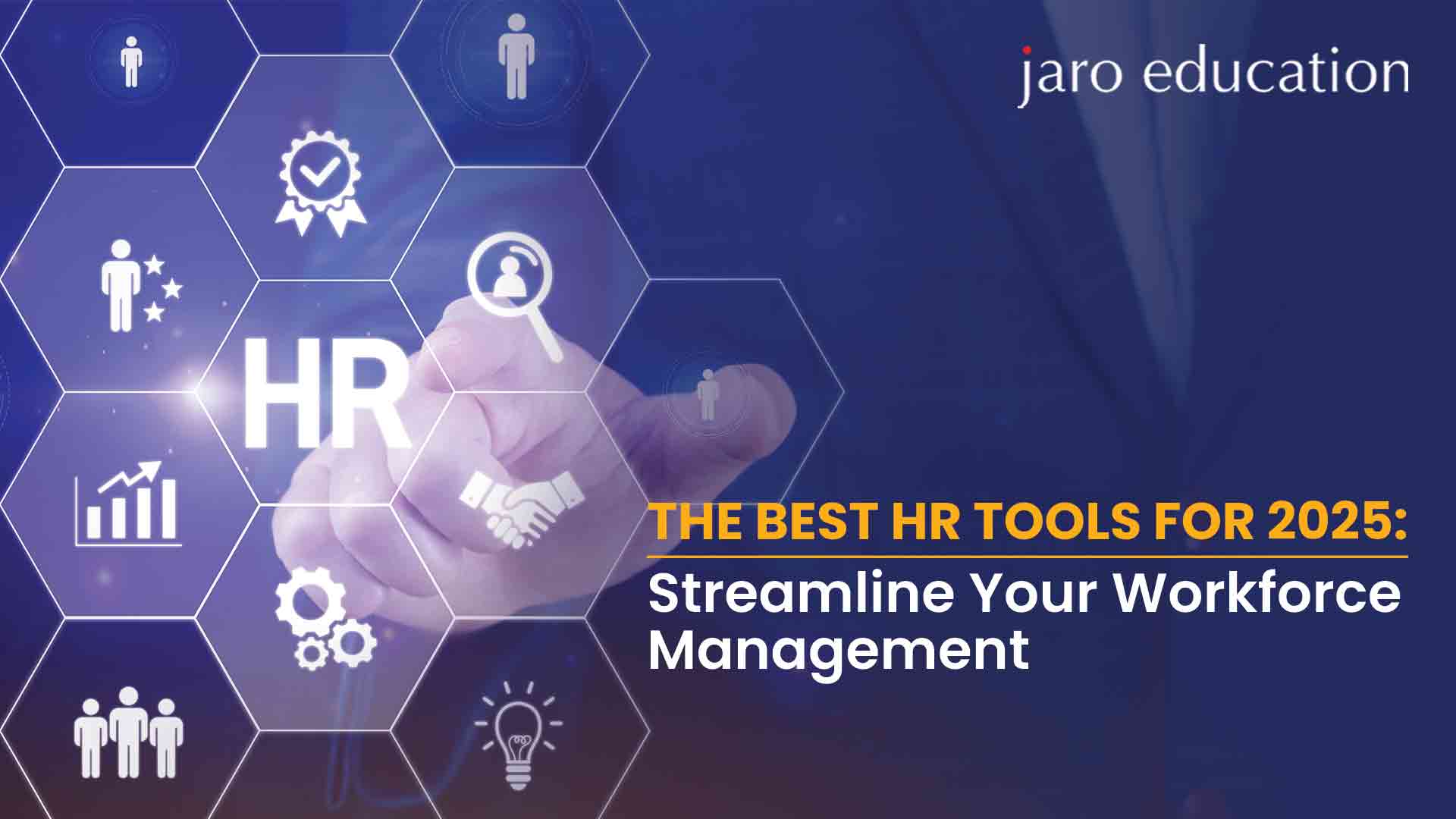What is Human Resource Management (HRM)? A Comprehensive Guide
Table of Contents
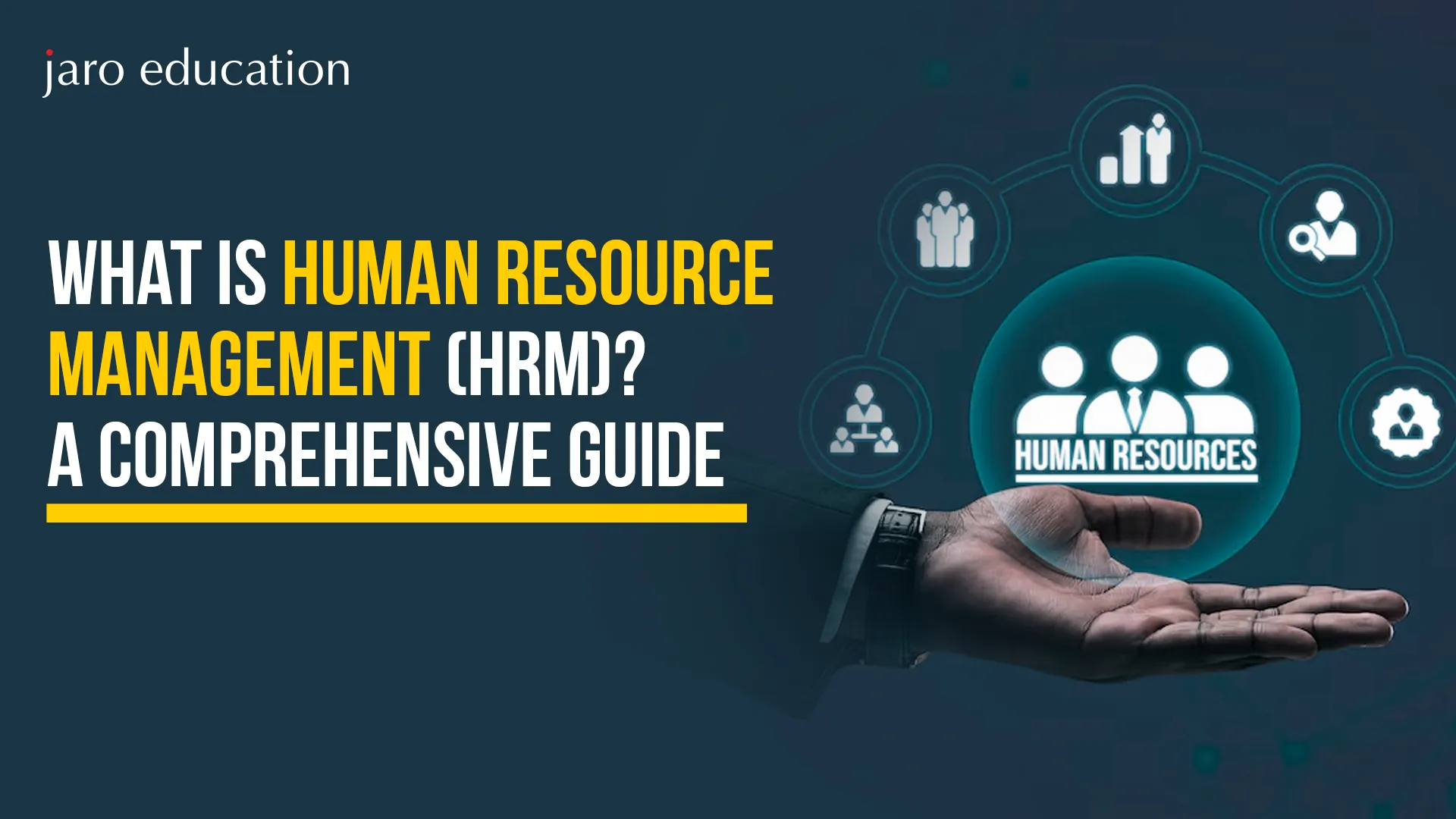
- jaro Education
- 30, March 2024
- 2:00 pm
What Is HRM? Let Us Break It Down!
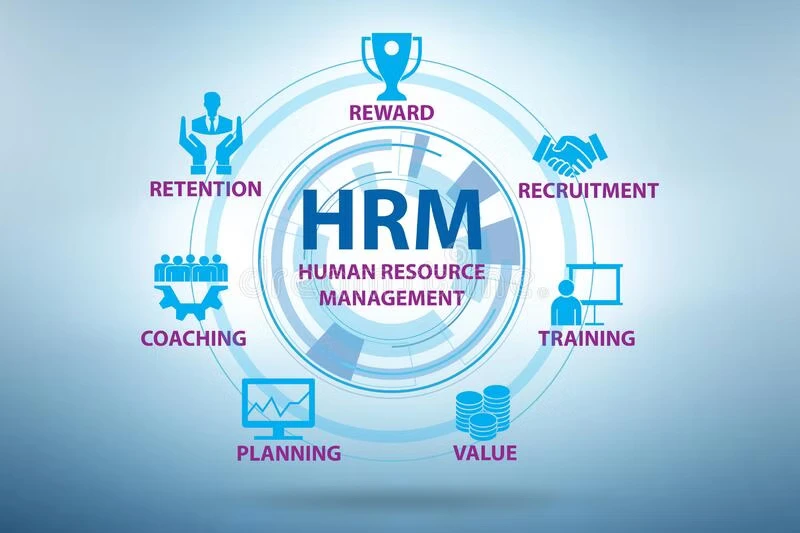
*Peak framework
Picture building a company from scratch. There is the product, the visionary behind it, and the budget, but what is missing?
People. Not just any people, right people, in the right roles, with the proper motivation! This is where HRM or Human Resource Management, comes in.
So, what is human resources?
In essence, HRM’s full form is the art and science of people at work. Hiring, training, retaining, and motivating the people whom HRM considers fitting is representative of their journey. How long may their journey be? From recruiting channels to the administering of rules and policies, it’s about a sound environment where people grow and contribute to the business’ HR advancement.
HRM is the lifeblood of every thriving organization that aligns people strategy with the business, nurtures a great culture, and converts employees into brand ambassadors of human resource management.
Are you ready? Let’s take it one step further: HRM isn’t just about resumes- it’s about the future of work!
What Is The Importance Of Business HR?
The Human Resource management (HR) sector now plays the most important role in business success through the achievement of the management of an organization’s most valuable asset, its people. Strategic HR practices not only enhance employee satisfaction but also add significantly to profit and operational efficiency. The following are the ways that HR contributes to business success with supporting statistics:

- Business talent acquisition and retention
HR, or human resource management, is responsible for drawing, hiring, and retaining the appropriate talent quantities according to company goals and culture. Effective HR strategies lead organizations to hire individuals who first have the required skills and then fit into the team, thus decreasing the request for replacement and turnover costs.
Statistical Insight: Effective talent acquisition strategy can help companies save on turnover costs as much as 40% (Work Institute).
- Employee Engagement and Productivity
HR takes the lead role in improving employee engagement that directly translates to productivity. Engaged employees demonstrate a high level of motivation, commitment, and performance. HR helps in enabling a business HR environment where employees feel valued, with the result being greater innovation and improved business outcomes in human resource management.
Statistic: Organizations with high employee engagement have seen a 21% increase in profitability (Gallup).
- Performance Management and Development
HR is extensively involved in monitoring and improving employee performance through goal setting, appraisals, feedback, and professional development programs. It is through such a performance that the management system ensures that employees are continuously growing and contributing to the overall success of the organization. Areas that need improvement may be identified, and the strengths/resources of the employees can also be detected by those performance management systems in human resource management.
Impact: About 30% more employee performance is found in organizations with strong performance management practices (McKinsey & Company).
- Training and Skills Development
HR is at the core of making training and development available to employees so that they can strengthen their skills, remain relevant in their profession, and adjust to the changing demands of the industry. This renders the workforce more knowledgeable in human resource management and able to deal with problems when they arise.
Benefit:
- Organizations that invest in the development of employees achieve 34% higher retention rates (LinkedIn Learning).
- Legal Compliance and Risk Management HR ensures that organizations uphold the labor laws, regulations, and ethical practices, which will prevent the organization from getting into legal issues such as lawsuits, fines, or reputational damage.
- HR takes care of all the legal and regulatory frameworks required, ranging from employee contracts to workplace safety.
- Organizational Culture and Employee Relations
HR brings the very culture of the organization through policies designed to promote a good work culture—positive in every aspect. The management and resolution of conflicts, along with the establishment of a platform for open communication, closely align with the employee’s experience and shape the organizational culture accordingly. Such culture helps in boosting morale, loyalty, and overall employee performance.
Impact: Companies that have great organizational culture outperform competitors “30% more” (Harvard Business HR Review).
- Companies are Expected to Be in Charge of Compensation and Benefits.
HR is charged with ensuring that there is a competitive pay structure in human resource management that would both pull the company into place and entice top talent as well as motivate its staff to perform optimally. This includes salaries, bonuses, health benefits, and other benefits earned in addition to other packages.
Simply put, HR makes the difference between success and failure in business. HR affects factors like employee engagement and diversity, training, and compliance. Therefore, the investment in strategic HR initiatives by business HR will pave the way for enhanced performance, workplace culture, and sustainability to answer the question, what is human resources?
Features of Human Resource Management
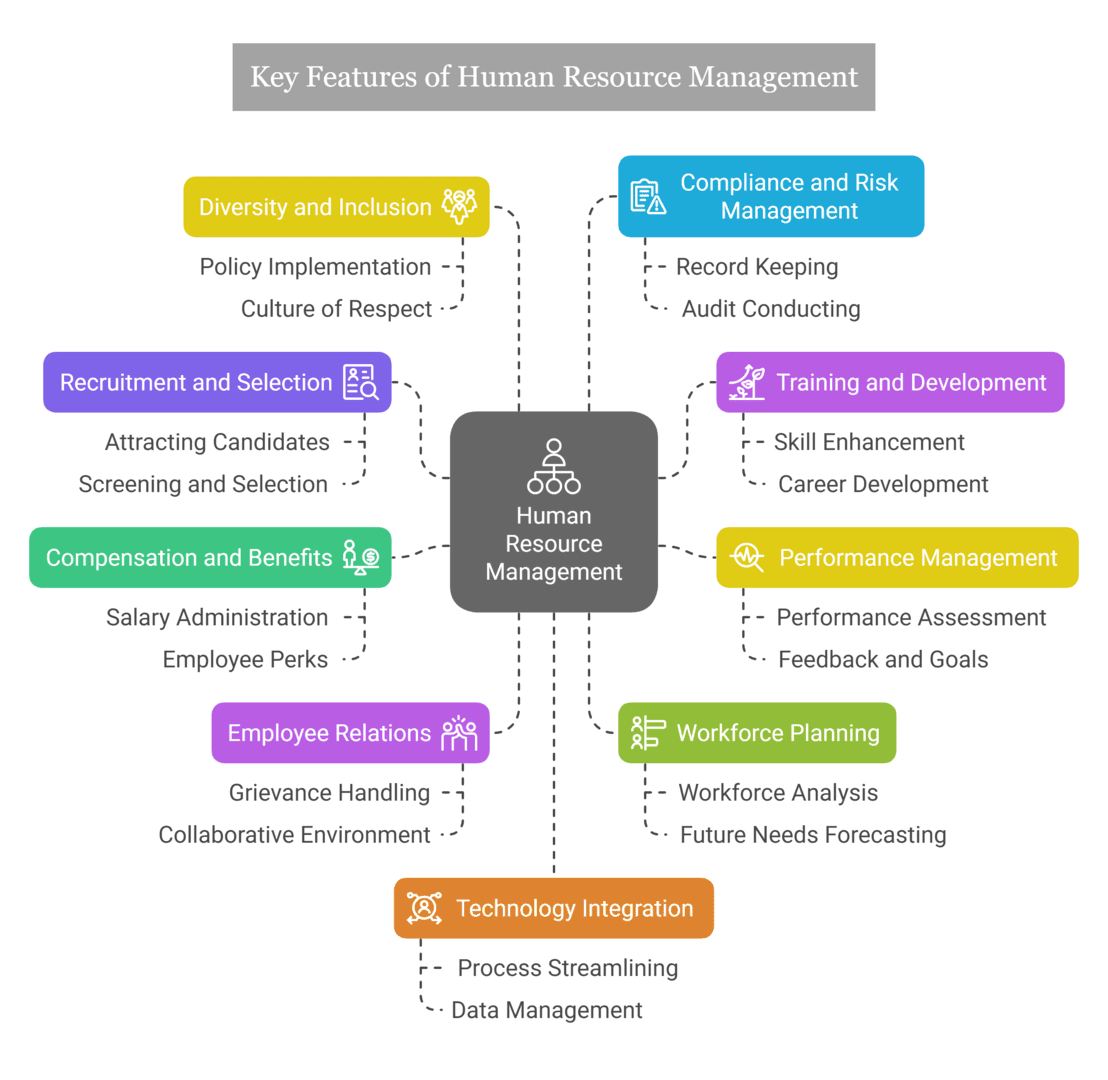
1. Recruitment and Selection
The HRM process includes attracting, screening, and selecting qualified candidates to fill posts. This process helps the organization employ persons who have requisite skills and would fit into the culture of the company for human resource management.
2. Training and Development
Training and development are fundamental and important concepts within HRM, whose full form is human resource management. Organizations equip employees with training programs meant to develop their skills, knowledge, and competencies for better performance at work and career growth.
3. Performance Management
The key factor of human resource management is the establishment of performance management systems that evaluate, provide feedback, and set goals for employee performance. This process is meant to acknowledge those employees who perform at the highest levels and identify those areas in which improvement is desired.
4. Compensation and Benefits
Human resource management enters into all aspects of the design and administration of compensation and employee benefits. Salary administration, bonus systems, health insurance, pension plans, and other perks of the job that will attract and retain talent are included in these aspects.
5. Employee Relations
Human resource management helps with all aspects of positive employee relations. It involves grievance handling, creating a collaborative work environment, and ensuring compliance with labor laws and regulations.
6. Workforce Planning
Human resource management enables strategic workforce planning to ensure that the organization, at any given time, has the right number of workers with the right set of skills. This involves assessing the existing workforce capabilities and predicting future requirements.
7. Diversity and Inclusion
Human resource management aims to establish diversity and inclusion in the workplace for a diverse workforce. This characteristic entails activities aimed at instituting respect and equality as corporate policies and practices.
8. Compliance and Risk Management
HRM ensures that organizations operate under the law in hiring and minimize any attendant risks. These include keeping thorough records, conducting audits, and instituting policies complying with labor standards.
9. Organizational Development
Where human resource management intervenes in organizational development is as it relates to change management initiatives while also working upon the overall improvement of the organizational culture and strategic effectiveness.
10. Technology Integration
Implementation of technology in modern HRM is used for process automation and better communication and data management. Human Resource Information Systems (HRIS) are used for efficient maintenance of records and data analysis.
Difference Between HRM and HRD
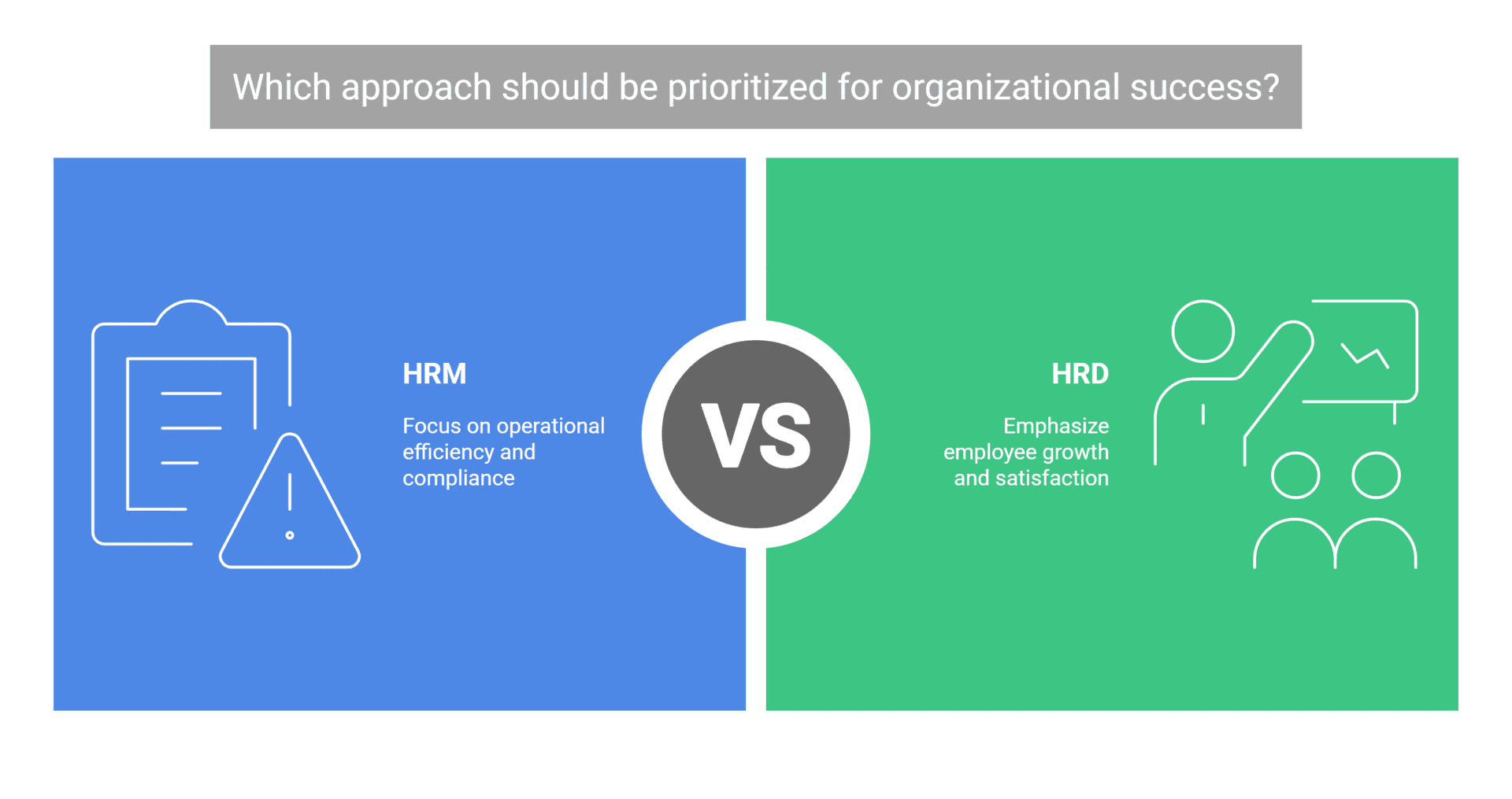
| Aspect | HRM (Human Resource Management) | HRD (Human Resource Development) |
|---|---|---|
| Definition | An overall management of people in the organization, which involves the processes of recruitment, performance, and reward | HRD is a sub-field of HRM directed toward improving the skills, knowledge, and ability of employees for better prospects |
| Focus | Manage people by organizational goals | Develop individual potential through training and career exposure. |
| Main Goal | Make sure the right people are in the right roles to meet organizational objectives. | Provide employees with the skills and knowledge they need for personal and professional growth. |
| Scope | The broad scope of HRM includes recruitment, policies, employee relations, remuneration, etc. | HRD has a narrow scope, mostly training, development, and career planning. |
| Time Frame | Short- to medium-term, concentrating on day-to-day functioning.
Long-term focus on employee development and future growth. | Immediate Focus-Reactive Action: Focused on preparing workers for immediate activities in the organization and their needs.
Strategic Action-Proactive Focus: Preparing the staff for competencies and changes in task requirements in the future. |
| Objective | Aligning employees with organizational goals and managing workforce performance | Broad-based improvement of employee competencies to enhance role performance and growth potential. |
| Examples of Functions | A typical HRM function includes recruitment, payroll management, employee benefits administration, performance management, and conflict management. | Examples include training programs, career counseling, leadership development, and employee empowerment. |
| Management Focus | Providing efficient management for employees and development-related affairs. | Giving thorough management for employee learning and growth. |
| Strategic Role | An arrangement is made to ensure proper management of a workforce in line with immediate business HR needs. | An arrangement is made for preparing an employee for emerging roles contributing to organizational success in the future. |
The table compares the two concepts directly. If anything further is needed regarding elaboration or examples, mention that too!
Best Human Resource Management Course Online
Executive Development Programme in HR Analytics—XLRI Jamshedpur
With the revolutionary XLRI’s People Analytics Programme and Human Resource Analytics Programme, the HR function is completely different: data-driven. These equip HR professionals with an in-depth understanding of descriptive, predictive, and prescriptive analytics. The HR Analytics Programme is mainly catered toward participants who may not be experts in math/statistics. It would be done primarily with SPSS and also through MS Excel at the beginning.
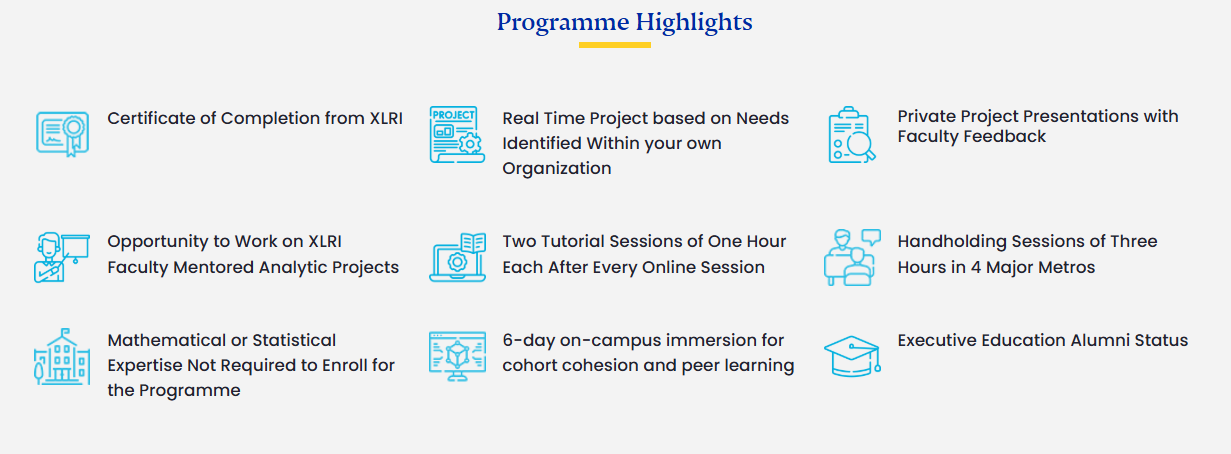
Eligibility Criteria:
Qualifications:
- For Indian participants—graduates (10+2+3) or diploma holders (only 10+2+3) from a recognized university (UGC/AICTE/DEC/AIU/State Government) in any discipline.
- For international participants—graduation or an equivalent degree from any recognized university or institution in their respective country.
Experience:
- HR professionals with a minimum of 2 years of work experience in the field of HR.
- Non-HR professionals should have a minimum of 5 years of overall work experience.
- Note: XLRI & Jaro Education reserves the right to cancel the candidature of any candidate at any point during the Programme for any misconduct or misleading information.
Discover Top Career Strategies and Guidance with Jaro Education
At Jaro Education, we show you the way and the means through which your career targets become reachable. The support we provide is all-encompassing; whether you want a helping hand to further improve your skilled hands, pursue upward mobility in your occupation, or change fields, our team of mentors and industry professionals offers you solutions customized around your career objectives.
An Explanation of the Features of the Career Guidance and Support Program:
- Personalized Career Counseling: Counseling sessions tailored to match your education levels toward your professional goals
- Industry-Relevant Programs: These programs will get you advanced programs and certifications to arm you with the competencies that are needed today.
- Job Placement Support: We provide placement support and internships through our tie-up with the best corporations involved in blocking a specific career path.
- Support in All Phases: Continues to end in mentorship and access to the networks necessary to sculpt that career and hone skills to fit in with the ever-changing labor market.
At Jaro Education, education isn’t just a foundation; it is a reference and tools to build a career on. Allow us to help you realize your potential and take the next step in your career.
Conclusion
That is, effective management of the company’s most important asset—its people—will determine whether the company will be a success or failure. HRM brings together a multiplicity of functions, from recruitment to development of employees to performance management and compliance with the labor act. Through aligning human resources with organizational goals, HRM serves not only to enhance operational efficiency but also to create a positive workplace culture that takes employees’ satisfaction and productivity to an even higher level.
The impact of HRM becomes even more critical since business HR is grounded in the evolving competitive environment, where they have no choice but to keep up with the times. However, HRM enables organizations to get proper human assets, develop their capacity, and follow new market values and trends. So it is for strategic management of the company’s people, since its efficiency in this is effective for the long term, increases innovation, and ensures that the organization does not stagnate.
HRM is an area that does not only concern itself directly with employees’ welfare in the organization, but it deals with how the individuals and organizations will, henceforth, thrive together.
Frequently Asked Questions
The main functions of HRM include:
- Recruitment & Selection: Hiring the right people for the job.
- Training & Development: Providing learning opportunities to enhance skills.
- Performance Management: Monitoring and improving employee performance.
- Compensation & Benefits: Managing salaries, bonuses, and benefits packages.
- Employee Relations: Ensuring healthy relationships and resolving conflicts.
- Compliance: Ensuring adherence to labor laws and regulations.
HRM contributes by aligning employee skills, performance, and motivation with the organization’s strategic goals. Effective HRM leads to higher productivity, employee satisfaction, and retention, all of which drive overall organizational success.
HRM is a more strategic and proactive approach to managing people, focusing on development, performance, and organizational goals. Personnel Management, on the other hand, is more transactional, concerned mainly with administrative functions like payroll, hiring, and basic employee welfare.
Key skills required for a career in HRM include:
- Communication skills for interacting with employees and management.
- Problem-solving abilities to resolve conflicts and address issues.
- Leadership and team management skills for leading HR functions.
- Organizational skills to manage multiple HR activities.
- Knowledge of labor laws and regulations to ensure compliance.
Strategic HRM involves aligning HR practices and policies with the long-term goals of the organization. It focuses on using HR as a competitive advantage to drive business performance, enhance employee engagement, and ensure organizational sustainability.





